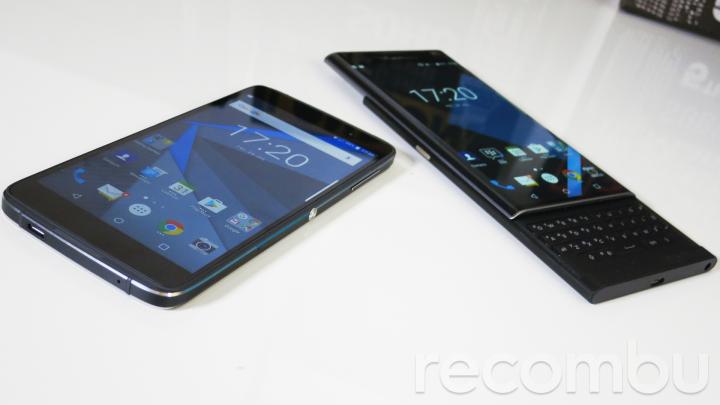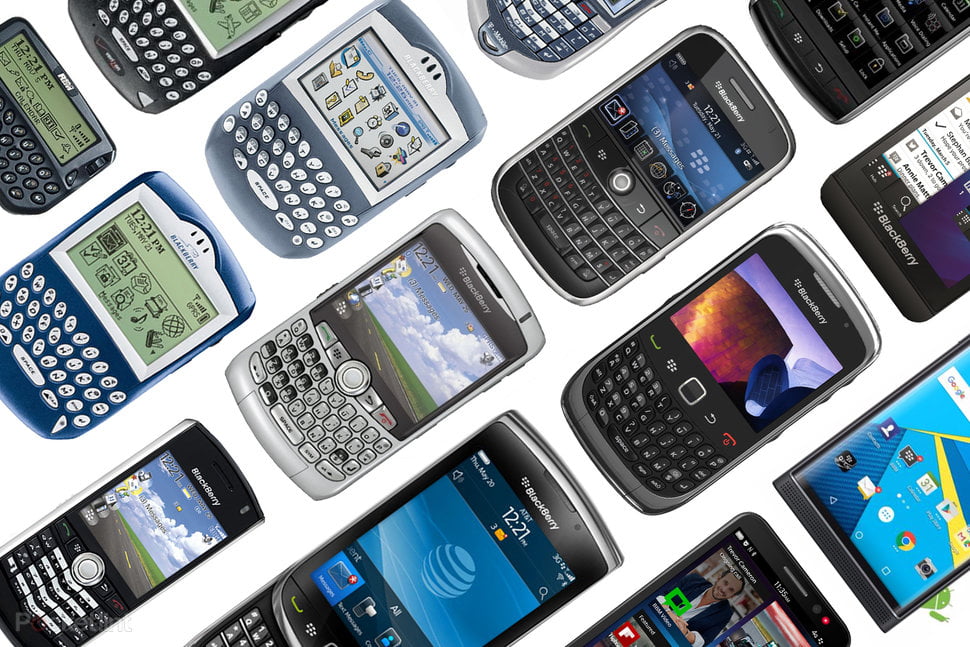
The new BlackBerry DTEK50 continues the trend of security-centric Android-powered phones from the Canadian company, but how does it compare to the 2015 flagship, the Priv?
BlackBerry’s first Android phone, the Priv was a surprise hit with its powerful hardware, considered design and its ability to retain some of the finest aspects of BlackBerry’s previous handsets, whilst also embracing Android. Now we’ve got a more affordable Android-powered ‘Berry in the newly unveiled DTEK50, which is billed as ‘the most secure Android smartphone in the world’.
At a glance
| BLACKBERRY DTEK50 | BLACKBERRY PRIV | |
|---|---|---|
| SCREEN SIZE | 5.2-inches | 5.4-inches |
| SCREEN RESOLUTION | Full HD (1920×1080) | WQHD (2560×1440) |
| WEIGHT | 135 grams | 192 grams |
| OS | Android 6.0 w/ BlackBerry Security | Android 6.0 w/ BlackBerry Security |
| REAR CAMERA | 13-megapixels | 18-megapixels |
| FRONT CAMERA | 8-megapixels | 2-megapixels |
| PROCESSOR | 1.5GHz/1.2GHz octa-core Snapdragon 617 | 1.8GHz/1.4GHz hexa-core Snapdragon 808 |
| MEMORY | 3GB RAM | 3GB RAM |
| STORAGE | 16GB. Expandable via microSD up to 2TB | 32GB. Expandable via microSD up to 2TB |
| BATERY | 2610mAh | 3410mAh |
Design
Whilst BlackBerry has made touchscreen handsets in the past, they’ve almost always been accompanied by similarly-specced physical keyboard-laden counterparts (the Z10 and the Q10, for example). The Priv not only offers a full touchscreen-based Android experience but also conceals a slide-out physical QWERTY keyboard to appeal to the die-hard BlackBerry fans as well.
There are some nice cues throughout the Priv’s design, like its curved glass display and faux carbon fibre back, but despite packing a lot of hardware into a relatively compact footprint, it’s still a large, thick, weighty phone by comparison to many of its rivals.

If bulk is an issue, then the DTEK50 makes for a great alternative, as it’s the company’s thinnest handset ever (at 7.4mm versus the Priv’s 9.4mm) and lightweight for a phone with a plus 5-inch display at 135 grams (versus 192 grams).
The DTEK50 also boasts a finely chamfered metal frame and better grip from its textured back, bet the bezels around the display are fairly large, pushing the footprint to a much bigger size than the screen actually covers, not to mention the loss of a physical keyboard – one of the most iconic aspects of BlackBerry’s most successful devices.
Screen
The 5.4-inch display on the Priv was at launch and still is, an absolute stunner. Packing AMOLED tech and WQHD resolution, the Priv is a visual delight, from clear clean text on websites and documentation to vibrant games and videos. The curved edges are a nice premium touch too, offering a pleasant feel under-finger when interacting with Android.

By comparison, the 5.2-inch Full HD screen on the DTEK50 feels decidedly more pedestrian. It still ticks all the fundamental boxes for work and pleasure, but it isn’t as bright or as punchy as the Priv’s panel. That’s not to say the DTEK50 has a bad display, just a more conventional one.
OS
Google has made huge strides in ensuring that Android is a more secure operating system now than it’s ever been before, but naturally, BlackBerry has taken things a step further, by adding encryption on every level from the processor upwards.
The arrival of the DTEK50 highlights the company’s commitment to zero-day patches (fixing security holes identified by Google before it publicises them), but both phones now enjoy the same level of support following the Priv’s upgrade to Android 6.0 Marshmallow, which the DTEK50 runs out the box.

Following the upgrade, both the Priv and the DTEK50 also feature the latest iterations of BlackBerry Hub, the company’s intuitive keyboard, which now boasts swipe typing as well as flick typing and the productivity tab, keeping your appointments front and centre.
As we discovered when the Priv first launched, BlackBerry has made smart, considered tweaks to Android that focus on productivity and security, and both phones feel as evenly balanced as each other thanks to the company’s pro-active update strategy.
Performance
As we mentioned earlier, the DTEK50 is the company’s first smartphone of 2016, but whilst it covers much of the same ground as the Priv with regards to features and security, it is aimed at a slightly different clientele, made most obvious by the hardware it’s packing.

The Snapdragon 617 chipset doesn’t offer quite the same punch as the hexa-core 808 SoC inside the Priv, with slower LTE speeds as well as less graphical power, and despite offering support for up to 2TB microSD cards, internal space tops out at 16GB, half that of the Priv’s native storage capacity. The DTEK50’s thinner waistline also means a smaller 2610mAh battery (versus 3410mAh in the Priv), so you can expect just over a day of use on a charge, which is slightly less than its larger sibling, however fast charging is on hand to balance things out.
Cameras
BlackBerry is known for shipping some specific handsets devoid of cameras completely, but the Priv blew us away with its OIS-laden 18-megapixel primary snapper late last year. The hardware ensures that stills and footage look good across the full gamut of scenarios, with solid low light performance with minimal grain and a decent dual-LED flash at the ready too.

4K video is also on the cards, which is one of the hallmarks of as true flagship phone in 2015/16, however, the front camera is a little less impressive.
Versus the Priv’s 2-megapixel front-facer, the DTEK50 offers up a significantly clearer 8-megapixel selfie-taker that can also capture Full HD video (compared to 720p HD on the Priv), however, although the 13-megapixel main sensor makes it a versatile snapper (with a dual-tone LED flash) it doesn’t quite match up to its bigger brother’s optics.
Verdict
The DTEK50 might see support further into the future, but with the Priv’s recent update to Marshmallow, the decision really comes down to hardware and price.

Despite all that power, the BlackBerry Priv is certainly the more niche handset of the two, with its unique form factor, stunning screen and superior camera tied to a price tag of £549.

The newer DTEK50 is markedly thinner and lighter, but more utilitarian in its approach and features more conventional hardware, but the gap isn’t as significant as you might think, especially when, at £275, it’s half the price.
[SOURCE:-RECOMBU]




